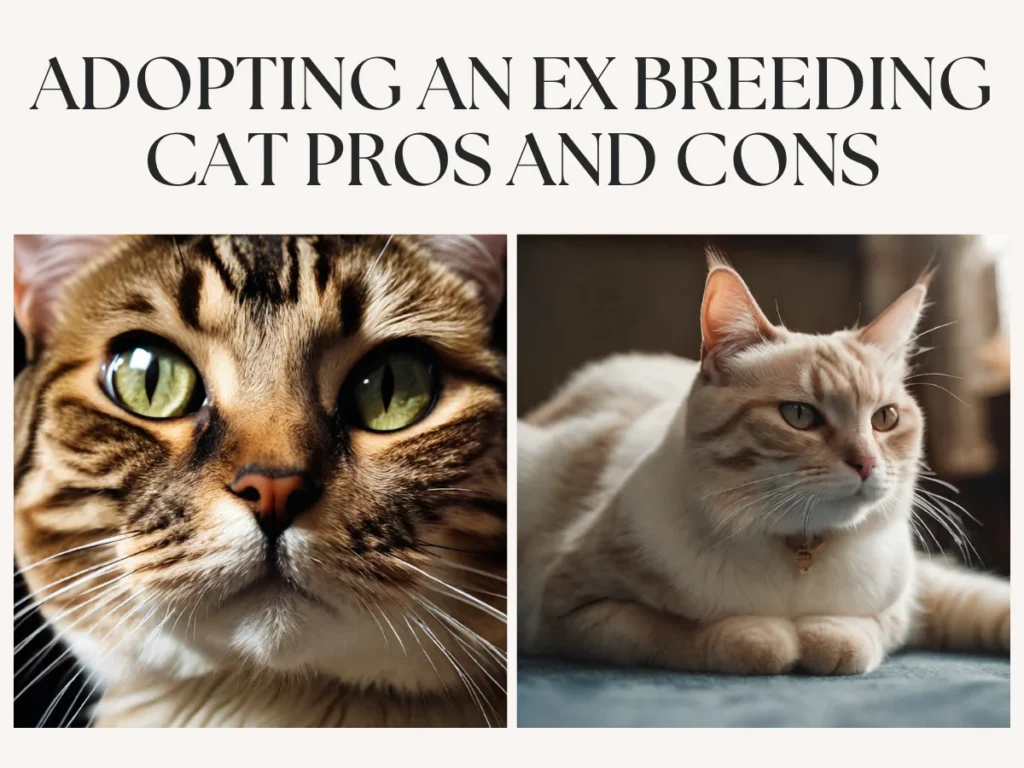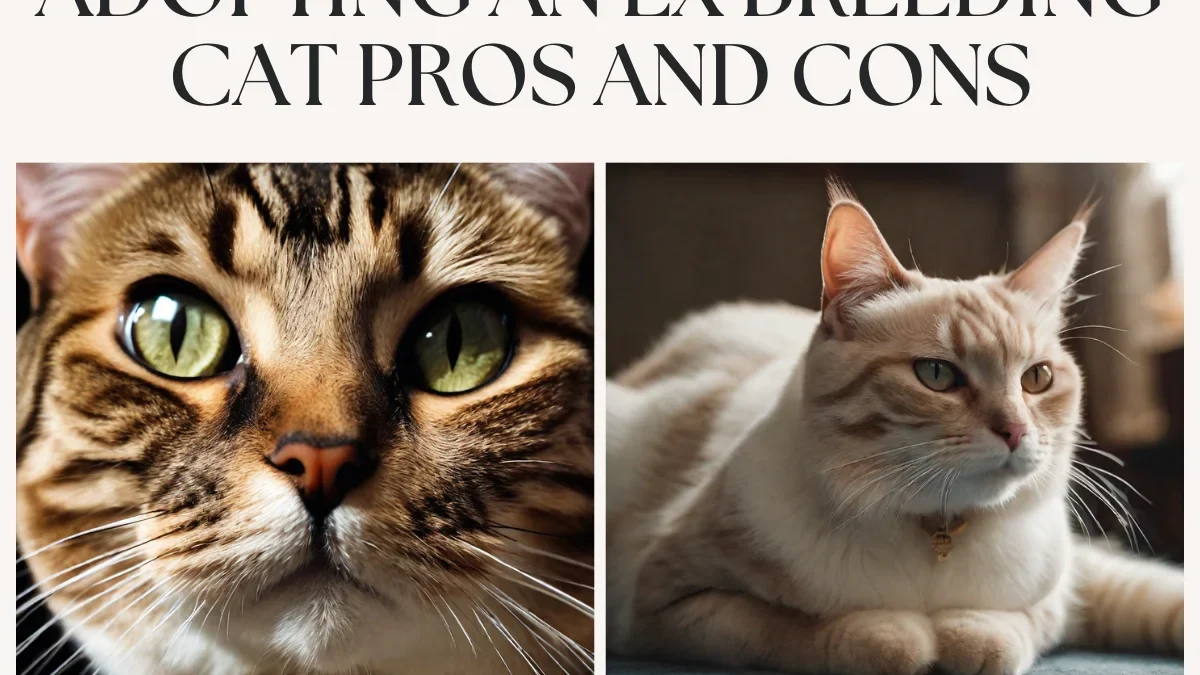Table of Contents
Adopting a retired breeder cat can be an incredibly rewarding experience for both the cat and the owner. These felines have spent their entire lives in a breeding facility, and now they have the chance to live in a loving and nurturing home. However, before making the decision to bring one of these cats into your family, it’s important to understand the pros and cons of this type of adoption. In this comprehensive guide, we will explore the various aspects of adopting an ex-breeding cat and help you make an informed decision.

What Are Breeder Cats?
Before we talk about Adopting An Ex Breeding Cat Pros And Cons we need to know what does Breeder cats means. Breeder cat also known as retired breeder cats or ex-breeding cats, are felines that have been used for breeding purposes in a breeding facility. These cats have typically spent a significant portion of their lives in a controlled environment, often in small cages, producing kittens to be sold. However, there comes a time when these cats are no longer able to reproduce or are deemed no longer useful to the breeding operation. At this point, they may be offered for adoption to loving homes.s
Breeder cats may range in age from a few years old to much older, depending on the specific circumstances. They can come from various breeds, with different temperaments and personalities. Some of these cats have been well-socialized and are accustomed to human interaction, while others may be more timid and require extra patience and care.
One important thing to note about breeder cats is that they may have had limited exposure to the outside world. Many have never experienced the comfort of a home, the joy of playing with toys, or the simple pleasures of being a cherished pet. They may have also missed out on routine veterinary care, which can lead to underlying health issues that need to be addressed.
It’s crucial to understand that breeder cats require special care and attention when transitioning from their previous life to a new home. Patience and understanding are key when it comes to helping these cats adjust to their new surroundings. With time, love, and consistent care, these cats can blossom into loving and affectionate companions.
Understanding the Life of an Ex-Breeding Cat
When you adopt an ex-breeding cat, it’s important to understand the unique experiences and challenges they may have faced throughout their lives. These cats have spent most of their lives in a controlled breeding facility, often confined to small cages and repeatedly bred to produce kittens for sale. They may have never experienced the simple joys of being a beloved pet in a loving home.
For ex-breeding cats, their previous lives were likely devoid of the comfort of a cozy bed, the freedom to roam, or the stimulation of playtime. Many of them have had limited or no exposure to human interaction and may be unfamiliar with common household sights, sounds, and routines. As a result, they may exhibit timidness, anxiety, or fear when first introduced to their new home.
These cats may require extra patience, understanding, and time to adjust to their new surroundings. They may initially hide, be hesitant to interact with humans, or exhibit nervous behaviors. It’s important to create a safe and secure environment for them, providing plenty of hiding spots, vertical spaces, and comfortable places to rest. It may take weeks or even months for an ex-breeding cat to feel comfortable enough to come out of their shell.
In addition to emotional challenges, ex-breeding cats may also have physical health issues that need to be addressed. They may not have received routine veterinary care, leading to dental problems, infections, or other ailments. Regular visits to the veterinarian are essential to ensure their well-being and to address any underlying health issues.

Pros of Adopting an Ex-Breeding Cat
Adopting an ex-breeding cat can be a truly rewarding experience, both for the cat and for you as the owner. There are several advantages to consider when deciding to bring one of these special cats into your family.
One of the biggest pros of adopting an ex-breeding cat is the opportunity to provide them with a loving and nurturing home. These cats have spent their entire lives in a breeding facility, often in small cages, producing kittens for sale. By giving them a forever home, you are offering them a chance to experience the love, comfort, and security that they may have never known before.
Another benefit of adopting an ex-breeding cat is the potential for personal growth and enrichment. These cats have often had limited exposure to the outside world and may be unfamiliar with common household sights, sounds, and routines. By helping them adjust to their new surroundings, you are not only giving them a chance at a better life, but you are also fostering your own patience, understanding, and empathy.
Ex-breeding cats can also be incredibly loyal and affectionate companions. Once they feel safe and secure in their new environment, they often form deep bonds with their owners. It’s truly heartwarming to witness their transformation from timid and anxious to loving and trusting.
Cons to Consider when Adopting an Ex-Breeding Cat
Adopting an ex-breeding cat can be an incredibly rewarding experience, but it’s important to consider the potential challenges and downsides before making the decision. Here are some cons to consider when adopting an ex-breeding cat:
- Emotional and Behavioral Challenges: Ex-breeding cats often come with emotional baggage and may exhibit behaviors such as fear, timidity, or anxiety. It can take time and patience for them to adjust to their new environment and build trust with their new owners. Some may have difficulty bonding or struggle with socialization. It’s crucial to be prepared for the possibility of a longer adjustment period and the need for ongoing support.
- Health Issues: Many ex-breeding cats have not received proper veterinary care, and as a result, they may have underlying health issues that need attention. Dental problems, infections, and other medical conditions are not uncommon. It’s important to be prepared for potential medical expenses and to provide them with the necessary veterinary care to ensure their well-being.
- Unknown Background: Unlike kittens or cats from known backgrounds, ex-breeding cats often have unknown or limited histories. This can make it difficult to predict their behavior or health needs. Some may have had traumatic experiences that may affect their ability to trust or form bonds. It’s important to be prepared for the unknown and to provide them with the patience and support they need to overcome any past traumas.
- Transition Challenges: Moving from a breeding facility to a home environment can be overwhelming for ex-breeding cats. They may be unfamiliar with common household sights, sounds, and routines, which can cause stress and anxiety. It’s important to create a safe and secure environment for them and to give them plenty of time and space to adjust to their new surroundings.
- Limited Socialization: Ex-breeding cats may have had limited exposure to the outside world and may not be accustomed to common household activities or interactions with humans. This can make it challenging for them to adapt to a home environment and interact with their new owners. It’s important to be patient and understanding, providing them with opportunities for positive experiences and socialization.

Preparing your Home for an Ex-Breeding Cat
When preparing your home for an ex-breeding cat, it’s important to create a safe and secure environment that will help them feel comfortable and confident in their new surroundings. Here are some tips to consider:
- Create a designated safe space: Set up a quiet and cozy room or area where your ex-breeding cat can retreat to when they need some alone time. Provide them with a comfortable bed, blankets, and hiding spots such as cat trees or covered crates. This space will serve as their safe haven while they adjust to their new home.
- Remove potential hazards: Ex-breeding cats may not be familiar with household items that could be dangerous to them. Take the time to pet-proof your home by securing loose wires, removing toxic plants, and keeping cleaning products and medications out of reach. Ensure that all windows and doors are properly secured to prevent any potential escapes.
- Gradual introductions: If you have other pets in the home, introduce them to your ex-breeding cat slowly and gradually. Provide separate spaces for each pet initially and allow them to sniff and observe each other through a cracked door or baby gate. This gradual introduction will help reduce any stress or tension between them.
- Patience and understanding: Ex-breeding cats may be nervous or anxious initially, so it’s important to be patient and understanding. Give them time to acclimate to their new environment at their own pace. Avoid overwhelming them with too much noise, commotion, or physical contact. Allow them to come to you on their own terms.
- Enrichment and stimulation: Provide your ex-breeding cat with plenty of toys, scratching posts, and interactive playtime to help stimulate their minds and bodies. This will help keep them entertained and provide an outlet for any pent-up energy. Offer a variety of toys, such as puzzle toys or feather wands, to keep them mentally and physically engaged.
Post-adoption Care Tips for your New Feline Friend
After you have brought your ex-breeding cat home, it’s important to provide them with the care and attention they need to help them adjust to their new life. Here are some post-adoption care tips to ensure your new feline friend feels safe, loved, and comfortable:
- Give them space: It’s normal for ex-breeding cats to be overwhelmed or scared in a new environment. Provide them with a quiet space where they can retreat to when they need some alone time. This will help them feel secure and allow them to adjust at their own pace.
- Establish a routine: Ex-breeding cats may not be accustomed to a daily routine, so it’s important to establish one for them. Set regular mealtimes, playtime, and grooming sessions. This will help them feel more secure and provide a sense of structure and predictability.
- Socialization: Slowly introduce your ex-breeding cat to other family members, including pets. Make sure to supervise their interactions and provide positive experiences. Patience and positive reinforcement will help them feel more comfortable around others.
- Provide mental and physical stimulation: Ex-breeding cats may not be familiar with toys or playtime. Gradually introduce them to interactive toys and play sessions to stimulate their minds and bodies. This will help them burn off energy and provide mental stimulation.
- Regular vet check-ups: Schedule a visit to the veterinarian for a thorough health check-up. Many ex-breeding cats have not received routine veterinary care, so it’s important to address any underlying health issues. Your vet can also provide guidance on vaccinations, dental care, and proper nutrition.
- Be patient and understanding: It may take time for your ex-breeding cat to fully trust and bond with you. Be patient and understanding, giving them the time and space they need to feel comfortable. Shower them with love, praise, and treats when they show positive behaviors.
By following these post-adoption care tips, you can help your ex-breeding cat transition into their new life with love and care. Remember, every cat is unique, so it’s important to be adaptable and provide the individualized attention they need.

Final Thoughts: Is an Ex-Breeding Cat Right for You?
Deciding whether to adopt an ex-breeding cat is a big decision that requires careful consideration. It’s important to reflect on your lifestyle, capabilities, and expectations before making this choice. Ex-breeding cats come with their own unique set of needs and challenges, and it’s essential to determine if you can meet those needs.
First and foremost, you must have the time and dedication to invest in helping an ex-breeding cat adjust to their new life. These cats may require extra patience, understanding, and love as they navigate their way through the unfamiliar territory of being a beloved pet. If you have a busy schedule or limited time to devote to their care, it may not be the right time to adopt an ex-breeding cat.
Consider your living situation as well. Ex-breeding cats may be timid and anxious initially, so it’s important to provide them with a quiet and secure environment where they can feel safe. If you live in a bustling household or have young children, it may not be the best environment for an ex-breeding cat to thrive.
Financial considerations are also important to think about. Ex-breeding cats may have underlying health issues that need to be addressed, and veterinary care can be costly. It’s crucial to ensure that you have the resources to provide them with proper medical care and any necessary treatments.
Lastly, evaluate your own expectations and readiness for the emotional journey of adopting an ex-breeding cat. These cats may take longer to adjust, may have trust issues, or may require ongoing support. It’s important to be prepared for the potential challenges and setbacks that may arise along the way.
Ultimately, adopting an ex-breeding cat can be a rewarding and fulfilling experience for both the cat and the owner. If you have the time, patience, and resources to provide them with a loving and nurturing home, then an ex-breeding cat may be the perfect addition to your family. However, if you have any doubts or concerns, it’s important to consider other adoption options or take the time to reassess your readiness.
Final words
In conclusion, adopting an ex-breeding cat can be a truly transformative experience for both the cat and the owner. While there are certainly challenges to consider, the rewards can far outweigh the cons. By providing a loving and nurturing home, you are giving these cats a second chance at life and the opportunity to experience the love, comfort, and security that they may have never known before.
One of the biggest benefits of adopting an ex-breeding cat is the personal growth and enrichment it can bring to your own life. By helping these cats adjust to their new surroundings, you are fostering qualities such as patience, understanding, and empathy. Witnessing their transformation from timid and anxious to loving and trusting is a truly heartwarming experience.
Ex-breeding cats can also become incredibly loyal and affectionate companions once they feel safe and secure in their new environment. The bond that forms between an ex-breeding cat and their owner is a unique and special one, filled with love and gratitude.
By adopting an ex-breeding cat, you are also making a meaningful difference in their lives and raising awareness about responsible breeding practices. You are giving these often-overlooked felines a chance to be seen, heard, and loved.
However, it’s important to carefully weigh the pros and cons and ensure that you are ready to meet the unique needs of an ex-breeding cat. They may require extra time, patience, and resources, and it’s essential to be prepared for the emotional journey that comes with helping them overcome their past.
FAQs:
Q: Do retired breeding cats make good pets?
A: Absolutely! Retired breeding cats can make wonderful pets. After their breeding days are over, they often transition into a more relaxed and calm lifestyle, making them great companions. These cats are typically already litter trained, well-socialized, and accustomed to human interaction, which can make the adoption process smoother. Additionally, providing a loving home to a retired breeding cat can be incredibly rewarding as they often show deep appreciation for the care and attention they receive.
Q: Is it wrong to get a cat from a breeder?
A: The decision to get a cat from a breeder is a personal one and depends on various factors. While there are responsible breeders who prioritize the well-being of their cats and breed ethically, it’s crucial to do thorough research and choose a reputable breeder who practices responsible breeding standards. It’s important to prioritize the welfare of the cats and ensure they are raised in a healthy and nurturing environment. However, it’s worth noting that there are also countless cats in shelters and rescues who are in need of loving homes, so adoption is another option to consider.
Q: Can you make a living off of breeding cats?
A: Breeding cats can be a complex endeavor, and making a living solely off of breeding can be challenging. Breeding cats requires a significant investment of time, resources, and knowledge. Responsible breeders prioritize the health and well-being of their cats, which often involves expenses related to veterinary care, nutrition, and maintaining suitable living conditions. Additionally, competition within the breeding community and the costs associated with breeding programs, including genetic testing and quality breeding stock, can impact profitability. Many breeders engage in breeding as a passionate hobby or side business rather than a primary source of income.
Q: When should you stop breeding a cat?
A: There are several factors to consider when determining when to stop breeding a cat. Responsible breeders prioritize the health and welfare of their cats, and it’s essential to consider the best interests of the individual cat and the breed as a whole. Some common reasons for stopping breeding include age-related concerns, declining health, genetic issues, or if the cat has produced a sufficsient number of litters. Additionally, reputable breeders may also retire a cat from breeding if they determine that it’s in the cat’s best interest to enjoy a retirement life as a beloved pet. It’s essential to consult with experienced breeders, veterinarians, and breed-specific organizations to make informed decisions regarding breeding practices.
Related Reads:

